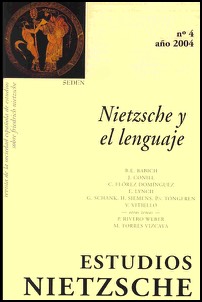La discriminación. Lenguaje, percepción y música a partir de Nietzsche
DOI:
https://doi.org/10.24310/EstudiosNIETen.vi4.9141Abstract
En una anotación de otoño de 1872 Nietzsche comenta que la música es un lenguaje capaz de una discriminación infinita. El argumento de este artículo se centra en el desarrollo de la idea de discriminación con relación a la sensación (o la experiencia sensible en general), para hacer una serie de aproximaciones a la fenomenología conciente de la sensación para después contrastar la idea de conciencia resultante con las observaciones de Nietzsche en el §354 de La gaya ciencia y su posible relación con el modelo monádico expuesto por Leibniz en la Monadología.
Downloads
Metrics
References
Davidson, Donald 2003: Subjetivo, intersubjetivo, objetivo, tr. O. Fernández Prat, Cátedra, Madrid.
Geertz, Clifford 1988: La interpretación de las culturas, tr. A.L. Bixio, revisada por C. Reynoso, Gedisa, Barcelona.
Goodman, Nelson 1976: Languages of art: An approach to a theory of symbols, Hackett, Indianapolis.
Jankélévitch, Vladimir 1983: La musique et l’ineffable, Seuil, Paris.
Leibniz, Gottfried Wilhelm 1981: Monadología, intr. G. Bueno, tr. J. Velarde, Pentalfa, Oviedo.
Nancy, Jean-Luc 2003: El ‘hay’ de la relación sexual, tr. F. Vidarte y C. de Peretti, Síntesis, Madrid.
Nietzsche, F., Fragmentos Póstumos I-IV (FP). Director ed. Diego Sánchez Meca. Madrid: Tecnos, 2006-2010.
Nietzsche, F., Obras Completas, I-IV (OC ). Director ed. Diego Sánchez Meca. Madrid: Tecnos, 2011-2016
Downloads
Published
How to Cite
Issue
Section
License
As of issue 21 (2021) this journal is published only in open access (diamond route).
From that number 21, like the previous numbers published in NIETZSCHE STUDIES, they are subject to the Creative Commons Acknowledgment-NoComercia-ShareIgual 4.0 license, the full text of which can be consulted at <http://creativecommons.org/licenses/by-nc-sa/4.0 >
It is the responsibility of the authors to obtain the necessary permissions of the images that are subject to copyright.
This work is licensed under a Creative Commons Attribution-NonCommercial-ShareAlike 4.0 International License.
Copyright generates two different rights: moral rights and patrimonial rights that EJFB recognizes and respects. Moral rights are those relating to the recognition of the authorship. They are rights of a personal nature that are perpetual, inalienable, unseizable and imprescriptible as consequence of the indivisible union of the author and his/her work.
Patrimonial rights are those that can be derived from the reproduction, distribution, adaptation or communication of the work, among others.







11.png)
